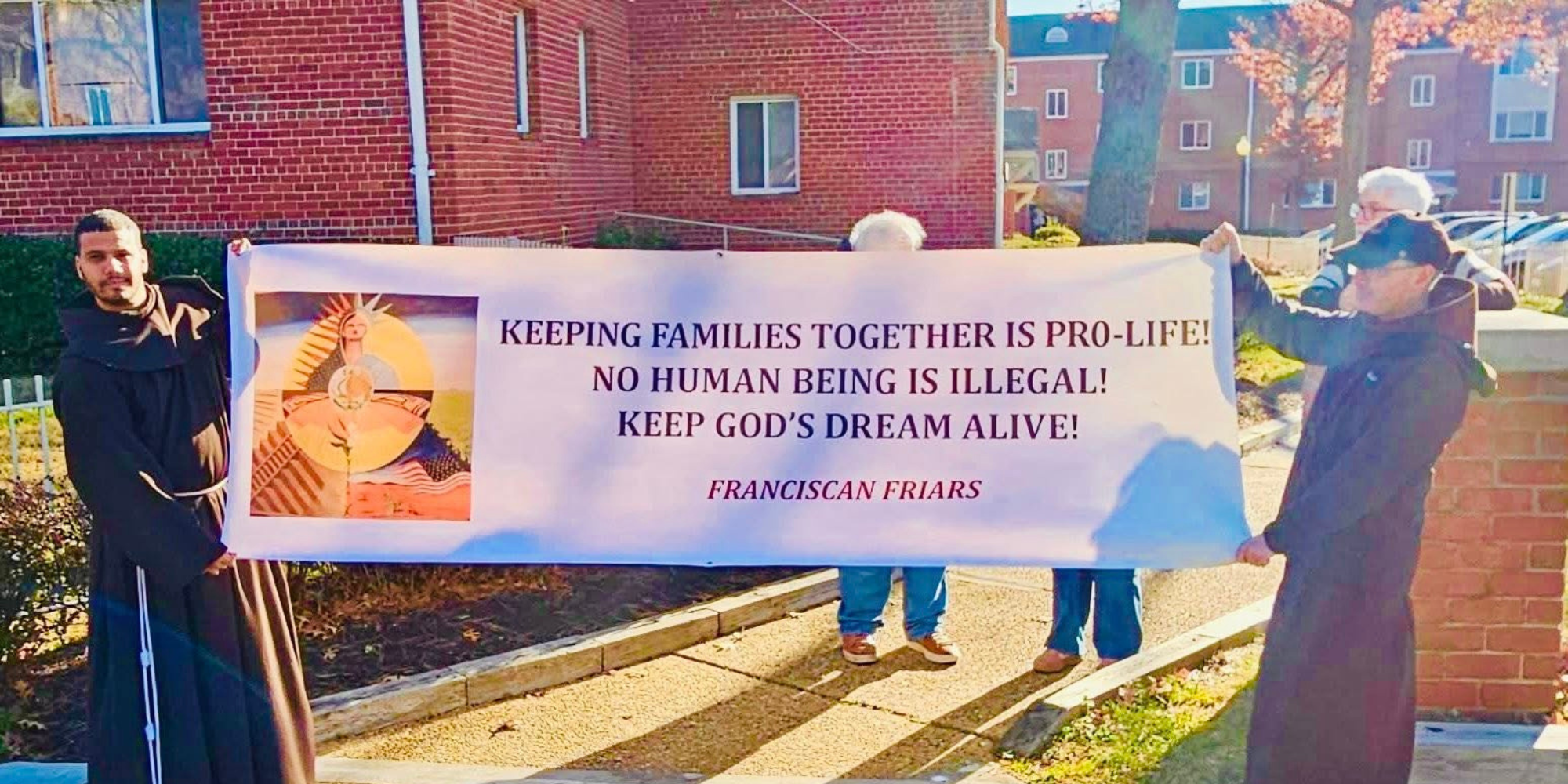Letter from Silver Spring: One friar's experience accompanying migrants in Maryland
Date Published: November 20, 2025
For decades, the global Order of Friars Minor has called for just and comprehensive immigration reform that preserves the dignity of people who seek asylum, refuge or a new beginning, while effectively securing the borders of the countries they seek to enter.
Earlier this year, the U.S. Government began what it has described as “the largest deportation program in American history.” The immigration policies that have followed have torn families apart and sowed fear among the many hard-working and law-abiding immigrants who have been part of our communities for decades, including those waiting to update their residency status in the US. Their fear is shared by the friars and others who serve them.
All human beings are created in the image of God and therefore possess an inherent and inalienable dignity and respect. The human rights that flow from the dignity of each human person include the right to migrate in the face of severe violence or desperate poverty. Our faith tradition calls us to “welcome the stranger” and to exercise justice and compassion when responding to the vulnerable.
In a special message on immigration released Nov. 12 by the U.S. Conference of Catholic Bishops, the USCCB encouraged clergy, consecrated religious and lay faithful to continue to accompany and assist immigrants in meeting their basic human needs, and to expand such efforts.
One Franciscan parish in Silver Spring, Maryland, has expanded its outreach to migrants and immigrants in recent months. In addition to providing social services, parishioners gather outside an immigration court every two weeks to pray and show solidarity. On Sunday, Nov. 16, in honor of the recent feast of St. Frances Xavier Cabrini, patron saint of immigrants, the St. Camillus community processed through a local neighborhood affected by ICE actions, offering solidarity to the people living there.
There are many ways to be present to immigrants who are living in fear. Below, Br. Steven Patti, OFM, shares his experience accompanying a community of immigrants in Maryland.
The parish next door sent out a notice asking if anyone would like to volunteer to be an “ICE lookout” at the 10:30 Mass in Spanish. This would mean two people wearing vests who would be a presence before and after Mass, and keeping a lookout for any ICE activity in the area. I am told that ICE has been around the area and that some community members have been taken away, leaving families behind. I am told to watch for black or white SUVs, with Texas plates.
I decide to volunteer. My companion on this Sunday morning is a woman named Pat, who has worked in health care and is now retired, and has spent two years in the Peace Corp in El Salvador. Her Spanish is good. She leads the way. Everything on this morning seems fine; there are Spanish-speaking vendors setting up tables to sell tacos. Pat tells me that if the vendors begin to disappear, that’s a sign that someone has seen ICE, as the word gets out and the vendors pack up their stuff and leave.
It’s a cool, sunny morning, late fall, a nice time of the year, and our walk is peaceful and uneventful, and that’s a good thing, given the reason we’re there. We’ve been instructed that if we see signs of ICE, we should call an usher at the church and let him know. Beyond that, we’re just sort of there, a presence, a couple of Anglos in vests (and me in habit) in a ministry of solidarity and presence. How, we wonder, have we come to this? What has our nation become? What’s a religious person to do?
For me, at least, offering to walk around the neighborhood, saying good morning to young Latino families, seems like something, a show of support for those among us who live in fear. Even though nothing happens on this Sunday morning, the very fact of our being out there is a sign that something might happen, and that in itself is chilling. It’s not the world I want to be part of. I’ve signed onto another kind of world altogether, a kingdom of God-centered world, and I want everyone to see that the God I believe in weeps over what is happening in my neighborhood and beyond.
At Mass, near where I stand is a young mother holding a young child, and she takes out a bottle and begins to feed him. The child looks up at me. I smile at him. His mother is patient and caring for him. She is any mother in any time, she is the mother of Jesus and the child is the Christ child who is born poor and needy in a hostile world. I want to announce to the nation: look, see! See how our God lives and moves among us…
A ministry of accompaniment
Editor’s note: The Franciscan tradition was founded in the spirit of itinerancy. The friars naturally hold people “on the move,” like migrants, close to their hearts. They also recognize that both the Old Testament and the Gospel are clear that Catholics must prioritize “welcoming the strangers” (those who are not yet part of the community and thus more marginalized).
Here are some ways that you can accompany migrants:


